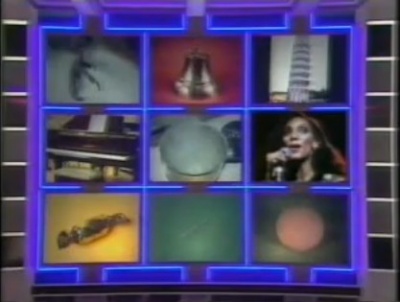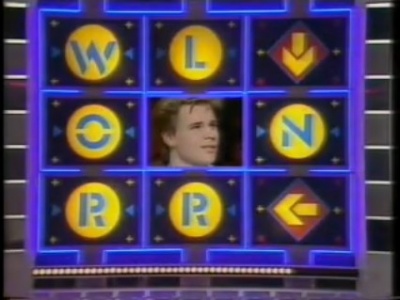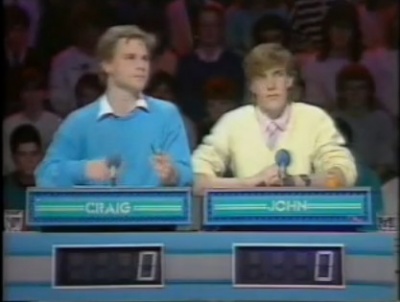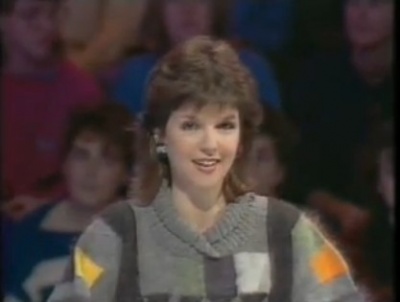Connections (1)
Contents |
Host
Sue Robbie (original host)
Co-hosts
Marian Chanter (with Richard Madeley)
Voiceover: Charles Foster
Broadcast
Granada for ITV, 1985-90
Later series co-produced by Action Time
Synopsis
Though a summer replacement for Blockbusters, this affable quiz mixed general knowledge quizzing with lateral thinking and a frisson of Countdown-style brainpower.
The meat of the quiz was called 'Connect The Clue'. The two contestants (initially teens, adults in later series) would buzz in for the opportunity to answer a standard general knowledge question for 10 points. After each question, a picture clue would be revealed on a projection board along with a short accompanying verbal description from Voiceover Man in case the picture isn't self evident (e.g. if the clue was TILT, the picture might be the Leaning Tower of Pisa with the verbal description "Its *tilt* is over 5 degrees"). Once two clues have been revealed, the contestant in control has a few seconds to work out the connection between them for 100 points. After an incorrect guess or running out of time, the next on-the-buzzer question was asked for control of the next clue. The value of the connection answer would drop by 10 points each time a picture was revealed. If the connection wasn't found by the contestant on the final clue, the answer was simply revealed without the other player having one final guess at it, so control of the buzzer was often important in the latter stages of the round.
In the early (ie Robbie/Madeley) series, the game board was used to play a round called 'Find The Figure', where eight-part mathematical equation was revealed in a clockwise pattern around the board and contestants had to buzz in and state the total hidden in the central square. Madeley used to claim that he hated that round, because he had apparently struggled with his maths exams - as if we cared.
After several rounds of connections, the high scorer would go on to the end game which, in some ways, is worthy of an article in itself, both for being clever as well as the very flexible way in which it was used over the different series.
The basic 'Link The Letters' game allowed the contestant 50 seconds (represented by 50 lights that light up beneath the game board) to find an eight-letter word. They had eight questions to answer - if they got it right, the first letter of that answer would be placed in the right place on the game board. (Bizarrely, although the 'first letter of each answer' rule applied throughout all the series, only Robbie ever seemed to make any regular mention of it - Madeley and Potter very rarely, if ever, did so.) If not, they simply had to pass and go onto the next question. After the eight questions were used up, the contestant would use whatever time they had left to try and find the mystery word, arranged clockwise, which sounds simple but becomes more difficult when some of the letters are missing and the word could start on any position.
During the early Robbie-series, contestants would only be allowed one chance to guess the word, with the inevitable result that some words, especially those that were a combination of two four-letter words, would be incorrectly identified (such as 'Backdraw' instead of 'Drawback' and 'Lamphead' instead of 'Headlamp'). Frankly, this seemed a bit harsh, given that the contestants were all young at the time. Thankfully, the rule was changed in later series to allow more than one guess - but even then, success was certainly not guaranteed, especially on one occasion, when a Scottish contestant had to identify the word as 'Mahogany' and he, not unnaturally, given his nationality, thought it was 'Hogmanay' - it could be all too easy to start on the wrong letter when a contestant had a word in his/her mind that seemed to fit but actually didn't.
During the Robbie era, the winners stayed on with the chance to play up to four 'Link The Letters' games to win prizes of increasing value, the top one usually being a worldwide holiday (rather like the Gold Runs on Blockbusters). During the Madeley- and Potter-eras, the game usually only served to increase the contestants' scores, rather than win them prizes.
During the Potter era, the end game (by then known as 'The Final Connection') involved being given the first and last of eight pictures (normally of famous people) on the board, then, with the help of up to three clues, having to identify the next picture in the sequence, which would have a connection of some sort (such as a shared surname) with the pictures before and after it. One example was: Tony Hancock; Sheila Hancock; John Thaw and so on until the final one, which was Sid James.
Overall, an enjoyable and well-produced quiz, but definitely at its best during the Robbie-era, as she was the best host and the show always seemed better with teenage contestants. Unfortunately, Madelely did not prove to be a good host - he could often be quite patronising and rude to his contestants - but thankfully, he only lasted one series, since he was soon to move onto 'This Morning' with his wife, Judy Finnigan.
Key moments
Good, tense end game.
During one of the Sue Robbie series, the first two pictures on the board in the 'Connect The Clue' round were 'Sue Robbie' and 'Throwing a punch'. When asked to find the connection, the teenage contestant responded, "They all have trouble in nightclubs." Sue was not impressed and answered, "You cheeky thing - no, that's not our connection!" before moving swiftly onto the next question. (The actual connection was 'Names of puppets', 'Sue' being as in Soo from 'The Sooty Show).
Catchphrases
(Robbie): "Hello - and a very warm welcome from all the 'Connections' team!"
"What's the connection?"
"No, that's not our connection..."
(If neither contestant managed to find the connection), "...So I'll have to ask Charles to tell us the connection."
(Before the 'Link The Letters' round): "You've got fifty seconds in which to do it - keep your eye on the board - and your connection time starts...now!" (Simon Potter changed this to: "Your 'Connections' clock starts...now!")
"Let's see if you're right!"
(If a contestant failed to 'Link The Letters'): "Bad luck - let's fill in the letters and see what the word should read...."
"Charles - don't keep us in suspense - tell us what he/she's won!"
"Well done - you've made the connection!" or "Found the figure" or "Linked the letters" - depending obviously on the round concerned.
(Madeley, when reading out a question as the 'time's up' buzzer sounded): "I've started....so I'll stop!"
Theme music
Composed by Bill Connor
Trivia
Host Sue Robbie also did Saturday Morning show TX with Tony Slattery and was last seen doing insurance adverts with Bill Dod (of Timekeepers and Aldi fame). Another notable point about Sue was that she was one of the first female quiz hosts to present on her own, since up until the mid-1980's, the quiz host role was almost entirely male-dominated. She was soon to be followed by the likes of Debbie Greenwood (First Class), Angela Rippon (Masterteam and What's My Line?), Penelope Keith (also What's My Line?) and Sarah Kennedy (Busman's Holiday), among others.
Marian Chanter co-hosted in the year following her success on The Krypton Factor. She presented the part of the show in which she was somewhere in the UK associated with a famous person and she would give clues related to that person in order for viewers to write in with the answer and win one of 5 prizes, which may have been the 'Connections' goody-bags that contestants were also given. Marian did an excellent job in this slot, which was one of the few good points of an otherwise substandard series.
During the Robbie-era, all contestants were given a 'Connections Camera' and the money that they won went to a charity of their choice. During the Madeley-era, the contestants won a 'goody-bag', and the 'money for charity' arrangement continued. When Potter took over, losing contestants would get a mini-TV and the winners would play for money in the end game - initially £1,000, later £400.
John Huntley, the producer for early series of the show was also a presenter and producer of Granada Reports at the same time. He later became head of news at Granada before leaving the company in 1992.
Originally produced at Granada's own digs in Quay Street, Manchester, later series were recorded at a studio in Kearsley (between Bolton and Manchester).
Bizarrely, a US pilot was shot for this in 2006.





